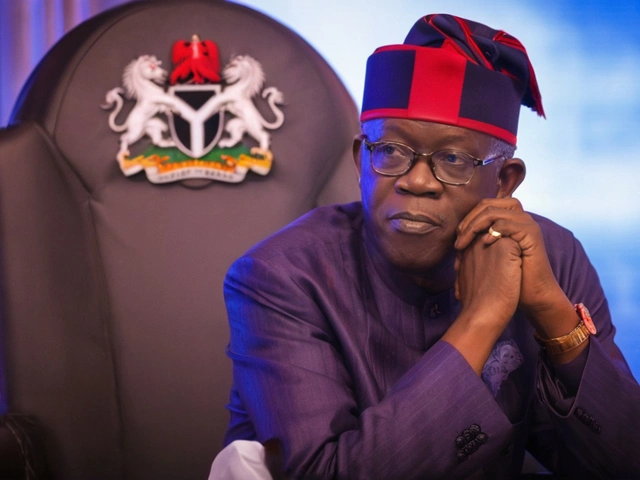National Judicial Council Backs Justice Kudirat Kekere-Ekun for Chief Justice Role
The National Judicial Council (NJC) has officially recommended Justice Kudirat Kekere-Ekun to President Bola Ahmed Tinubu as the next Chief Justice of Nigeria (CJN). This recommendation comes as a pivotal moment for Nigeria’s judiciary, adhering to the long-standing tradition and ensuring the smooth transition of power within the highest echelons of the judicial system. Presently the second in line among the Supreme Court justices, Justice Kekere-Ekun is set to replace Justice Ariwoola, who will retire at the mandatory age of 70 on August 22, 2024.
A Well-established Tradition
This tradition of selecting the second highest-ranking justice to succeed the retiring CJN has been a cornerstone of Nigeria's judicial appointments. The aim is to maintain stability and continuity within the judicial hierarchy. Each retiring Chief Justice hands over the reins to an experienced and capable successor, thereby safeguarding the integrity and consistency of the court's decisions. The NJC's recommendation of Justice Kekere-Ekun underscores this practice.
As is customary, the Federal Judicial Service Commission (FJSC) first nominates two potential candidates to the NJC. In this instance, the NJC found Justice Kekere-Ekun to be the most preferred candidate, with Justice Inyang Okoro as the reserve option. This structured process, aimed at ensuring that only the most qualified and competent justices ascend to the leadership of the Supreme Court, serves as a testament to the meticulous attention given to maintaining judicial excellence.
Who is Justice Kudirat Kekere-Ekun?
Justice Kudirat Kekere-Ekun has had a distinguished career in the judiciary. Born in May 1958, she has amassed a wealth of experience through her extensive service. She was appointed as a Justice of the Supreme Court in June 2013, adding to her impressive credentials that include her tenure as a Justice of the Court of Appeal and as a judge at the High Court of Lagos State. Her judicial career has been marked by her unwavering commitment to justice and integrity.
Throughout her illustrious career, Justice Kekere-Ekun has presided over numerous high-profile cases, demonstrating her profound understanding of the law and her dedication to upholding justice. Her judgments are consistently characterized by their depth of legal reasoning and clarity, earning her respect and admiration from her peers and the public alike.
The Role of the Chief Justice
The Chief Justice of Nigeria holds a crucial position within the country’s judiciary. As the head of the Supreme Court, the CJN not only presides over the court's proceedings but also plays a central role in the administration of justice across the nation. The Chief Justice serves as the chairman of the NJC and is instrumental in shaping the policies and procedures that govern the judiciary.
Moreover, the CJN represents the judiciary in its interactions with the executive and legislative branches of government, advocating for judicial independence and playing a pivotal role in maintaining the balance of power within the state. In this capacity, the Chief Justice's leadership and vision are essential in driving forward judicial reforms and ensuring the effective delivery of justice.
Looking Ahead: A Significant Milestone
If appointed, Justice Kudirat Kekere-Ekun will become only the second female Chief Justice of Nigeria, following in the footsteps of Justice Aloma Mukhtar, who served from July 16, 2012, to November 20, 2014. Justice Mukhtar’s tenure was noted for significant judicial reforms and her efforts in combating corruption within the judiciary. As such, Justice Kekere-Ekun's potential appointment is being viewed as a monumental step forward for gender representation in Nigeria's highest judicial office.
Justice Kekere-Ekun’s impending appointment marks not only a personal milestone but also an advancement in gender equality within Nigeria's judiciary. Her ascension to the position of Chief Justice would send a powerful message about the role of women in leadership and the judiciary's commitment to inclusivity.
A Smooth Transition
The transition process to a new Chief Justice is a critical period for the judiciary. The succession plan outlined by the NJC aims to ensure that this transition is as smooth and seamless as possible. By following the established protocol and selecting a seasoned and respected jurist, the NJC strives to uphold the integrity and stability of the judiciary during this period of change.
The committee responsible for screening and recommending the candidates is chaired by the third in line, Justice Anan Musa Abaji. This procedure, deeply embedded in tradition, ensures that the selection process is transparent and is conducted with the utmost diligence and respect for the office of the Chief Justice.
Maintaining Stability in Nigeria’s Judiciary
Continuity and stability within the judiciary are paramount for the rule of law and the administration of justice in Nigeria. As Justice Ariwoola prepares to step down, the NJC's recommendation of Justice Kekere-Ekun signals a commitment to these principles. Her impending appointment is poised to bring both continuity and a fresh perspective to the Supreme Court.
The judiciary's role in upholding democracy and ensuring justice for all citizens cannot be overstated. The smooth transition of leadership within the Supreme Court, facilitated by the NJC’s careful planning and adherence to tradition, reinforces the judiciary's independence and integrity.
Conclusion
Justice Kudirat Kekere-Ekun’s recommendation as the next Chief Justice of Nigeria is a significant development not only for the judiciary but for the nation as a whole. Her wealth of experience, unwavering commitment to justice, and potential to make history as the second female CJN highlight the importance of this nomination. As Nigeria looks ahead to this new chapter in its judicial history, the principles of stability, continuity, and progress remain at the forefront of this transition.





Leave a Comments